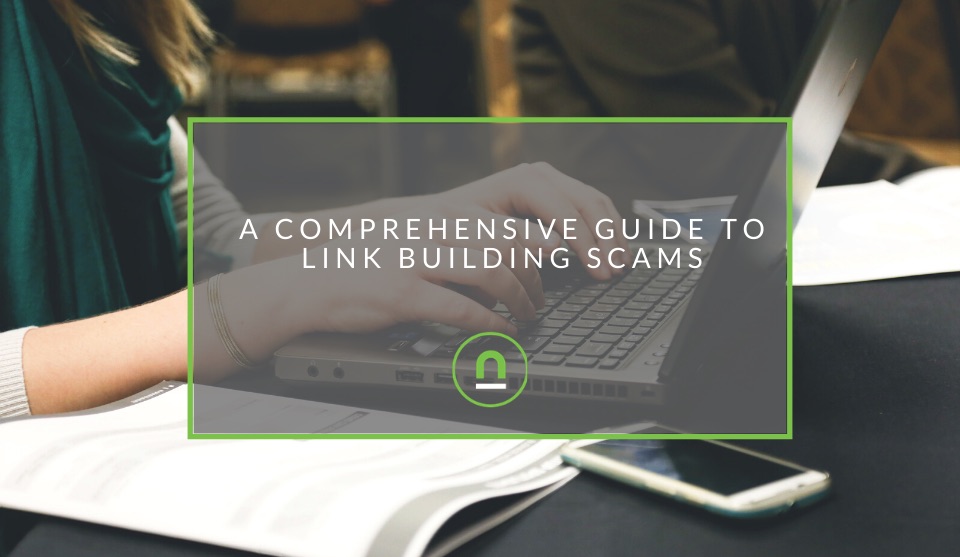Recent posts

Money Talks
A Guide To Mobile Trading Apps for South Africans
19 February 2026

Press Releases
Rehab Your Knee: A Free, Evidence-Based Guide to Smarter Recovery
12 February 2026

Money Talks
XRP vs. Stablecoins: Which Is Better for Cross-Border Payments in 2026?
28 January 2026

Press Releases
Sleep Expert Cautioning Against TikTok’s ‘Mouth Taping’ Trend
28 January 2026
Popular posts
Extravaganza
Trending Music Hashtags To Get Your Posts Noticed
24 August 2018
Geek Chic
How To Fix iPhone/iPad Only Charging In Certain Positions
05 July 2020
Extravaganza
Trending Wedding Hashtags To Get Your Posts Noticed
18 September 2018
Money Talks
How To Find Coupons & Vouchers Online In South Africa
28 March 2019
A Comprehensive Guide To Link Building Scams
19 July 2020 | 1 comments | Posted by Che Kohler in nichemarket Advice
Google has been the undisputed dictator when it comes to the SEO space ever since the world fell in love with its now-infamous page ranking and search algorithm. The internet is by no means less of a mess since Google arrived, but it's given us a distinct method of being able to skim the internet for relevant information.
Website owners are on a constant scramble to drive better rankings and contextually relevant traffic to their sites from search. Following Google's rules is the best way to do so, without an SEO or with an SEO guiding your efforts.
Google is never going to give you their secret sauce or their mix of 11 herbs and spices, but from the hints they do give us, there is plenty of room for interpretation and in some cases abuse.
The focus on link building
Link building is one of the heavily weighted ranking factors simply because it's so hard to do. Rationally speaking convincing sites either by contacting them or them finding your content to link to as they feel it's valuable or relevant makes for a decisive ranking factor.
While white hat SEO's are actively working on adding helpful links to relevant content, contributing via guest posting or syndicating content for links, others are looking for easier ways to try and get the edge.
SEO is still a cloak and dagger industry, and because there is no regulation, there are black markets where people sell links or link building services at a profit. These growth hacks can work if done correctly, but Google is aware of ti and actively looks to stamp it out with its core algorithm improvements and new deep learning models.
Getting into the black
As an SEO, I've dived into these black markets to find out how they work and if you can extract value from these services. I was able to come across five popular link schemes, and here is my take on how they work if you should try them or actively stay away from them.
If you're planning on working with a freelance link builder or hiring a link builder, you need to look at their methodology and if they employ some of these grey or black hat tactics. Ask your link builder in and out about how they will go about creating links, and if they mention any of the following, it could be a red flag.
1. Private blogging networks
- Spam level 2/5
Private blogging networks are a marketplace where webmasters of various sites list their websites as places that accept either guest posts, link inserts, or they are willing to write content for you to place a contextual link. Private blogging networks are not necessarily the worst place to find links if you're careful to pick the right sites. In many cases, the race to getting links drives people into spammier and spammier practices as they are paid per link.
In private blogging networks, you first need to make sure that you're getting links from sites that are in an applicable niche where the content makes sense for that site.
Next, you will need to look at the domain authority/domain rank of the site and evaluate if this domain has a healthy backlinking profile before accepting a link from it.
You also need to check if the site gets any traffic, no sense in getting a link on a site that gets zero traffic and could not refer you any traffic. Referral traffic is a big part of how Google reviews the relevancy of links.
Additionally, you'll also need to look at the link placement, if your links are stuffed into articles with multiple links or are it spread across natural other contextual links.
If you can meet all these requirements, then it could be worth jumping into these private blogging networks. In most cases it's not, these link builders will stuff any URL with a link so that they can bill you for the sheer volume of links.
2. 301 Redirect sellers
- Spam level 5/5
This one really sets me off as an SEO and is an outright scam and probably one of the laziest ways to build links I have ever seen, it's horrible that these services are even sold to people. Since many people don't understand SEO and there aren't real metrics provided by Google since they removed page rank, other services have come in to try and plug the gap, MOZ, AHREFs and SEM Rush all have their own metrics.
These metrics are only a vanity metric and point of correlation, not causation. These spammy link builders know how to manipulate these metrics and sell you on hitting a certain Domain Authority (MOZ) or Domain Rank (AHREFS) number, let's say 30.
To hit this metric they source several sites and send links to your domain, as the tool picks up these links it attributes a number to it, this doesn't mean your links have any quality, only that domains of a certain authority are pointing to you.
What they do is abuse their edit rights to several domains, create a new URL on this site and then set a 301 redirect to your site. The site owner won't know the page exists and only crawlers can pick up the 301 redirects to your site. A user will never find this link and is essentially a type of cloaking of links.
If you see ads for we'll get you to a 30 DA or 30 DR, please avoid it like the plague.
3. Content spinners
- Spam level 5/5
Content spinners take your content or popular content from other sites and then paraphrase them to try and spin up a new article that is "original content" when in fact it's just trying to fool plagiarism checkers. In many instances, these content spinners don't even check the flow of the article, spelling or grammar to see if makes sense and its all about creating articles they can stuff links into and then source payment.
If you do use content spinners, have a look at the quality of the content, review it for plagiarism and see if previous articles they have spun have been flagged or do they rank for search terms.
While some content spinners can work if you have a diversified enough link profile, I would encourage most early site link builders to stay away from this method.
4. Content syndicators
- Spam level 2/5
Content syndicators essentially take your content and repost it on other sites or blogs and then link back to your article as the source. If you're syndicating to websites with their own following like medium publications or Substack publications, then content syndicators can be a great way to expose your content to new readers, drive referral traffic and improve the rankings of your original article.
However, many content syndicators aren't working with the best sites that have traffic. They duplicate your content on sites that have zero or very little traffic and do nothing for your website and charge you for the link.
Content syndicators can be great if they have access to decent websites or used to dump up link diversification on a specific post you already have links pointing to from reputable sites. This additional link push could be enough to push you above competitive, but again, pick your battles with this one.
If you don't know how to evaluate sites for traffic or link diversification, then I suggest yous ta away from this method or you could end up wasting money.
5. Link farms
- Spam level 5/5
I honestly cannot believe this method still exists after all this time, but people are still selling this method to users. What they do is essentially create a webpage on various sites, and all it is is one massive page of links. In some cases, it's categorised by niches, but most times you're in a list with a pile of links.
This method doesn't work due to reasons like Google preferring contextually relevant links as they review the entire post and the practicality of the links in each post.
Additionally, the more links on a page, the less link juice you get since its split across every link on the page.
Finally, no self-respecting site would have a link farm page, so you're probably getting a link from a poor domain or worse, a domain flagged for spam.
Link farms have no place in 2020, stay away, please.
What if you've used these methods in the past
If you've used any of these methods in the past and you've seen flat or decreasing traffic, then these links could be damaging your domains ranking ability. You would then need to get an SEO in to review your backlinking profile or review them yourself and make a list of spammy backlinks and create a disavow file you can upload to search console.
The disavow will tell Google search you don't care for these links and for them to ignore them from their ranking calculations.
Link building the right way
The majority of these tactics are born out of laziness and thinking you're smarter than Google. Remember, they spend millions each year paying the best developers in the world to stamp out manipulation of the search rankings so if you're going to go up against Google; you're going to need more than buying links from a freelance site.
If you want to link building in a way you know will never be flagged by Google and assist in the quality of your domain, then it's best to avoid these strategies altogether. Paying for links is by no means a bad thing, but you'll need to be able to decern what they are offering you, and these link building schemes prey on the ignorance of consumers and are making money for a substandard product.
In best cases, it won't affect your search rankings; in worse cases, it could harm your domains ranking ability or even have it deindexed if the spam is so bad.
Contact us
If you would like us to improve your link building for your site or want to know more about digital marketing for your business, then don’t be shy we’re happy to assist. Simply contact us
Are you looking to promote your business?
South African Business owners can create your free business listing on nichemarket. The more information you provide about your business, the easier it will be for your customers to find you online. Registering with nichemarket is easy; all you will need to do is head over to our sign up form and follow the instructions.
If you require a more detailed guide on how to create your profile or your listing, then we highly recommend you check out the following articles.
Recommended reading
If you enjoyed this post and have a little extra time to dive deeper down the rabbit hole, why not check out the following posts on link building.
- How To Use The Forgotten Art of Dead Link Building To Boost SEO
- How To Use April Fools As A Link Building Tool
- How To Build Links From Journalists
- The Pain Of Link Building In Memes
- How To Use Broken Links To Earn New Links
- How To Start Reclaiming Lost Backlinks
- How To Build Links With Brand Mentions
- How To Build Local Links To Your Website
Tags: Link Building, SEO
You might also like
The Rise of AI Computing Power Assets
16 January 2026
Posted by Rehman Ali in Press Releases
An introduction to Cloud mining and monetising cloud computing as DLMining Reshapes Wall Street's New Anti-Inflation Investment Paradigm
Read moreAfricaworks Accelerates The Rollout Of Real Estate Investment Platform
20 January 2026
Posted by Nicolas Teisserenc in Press Releases
AWIP accelerates the rollout of its urban real estate investment platform in West Africa, raising €4m and fully deploying it into two off-market acqu...
Read more{{comment.sUserName}}
{{comment.iDayLastEdit}} day ago
{{comment.iDayLastEdit}} days ago
 {{blogcategory.sCategoryName}}
{{blogcategory.sCategoryName}}


